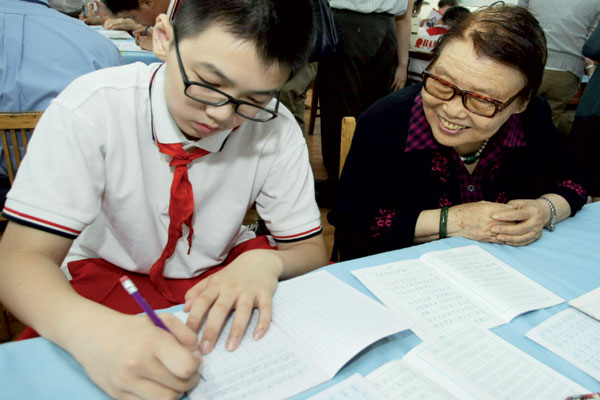A class of her own
Updated: 2013-01-08 14:53
By Cang Wei and Song Wenwei (China Daily)
|
||||||||
 |
|
Han Rufen, 82, cares for students at Pengcheng Special Education School, which she founded in 1989, in Xuzhou, Jiangsu province. Photos by Fu Qian / For China Daily |
A woman's struggle to educate her intellectually disabled grandson inspires her to start a special education school. Cang Wei and Song Wenwei report.
Han Rufen has dedicated her retirement to changing hundreds of intellectually disabled children's lives.
Known as "Granny Han", the 82-year-old principal of the Pengcheng Special Education School in Xuzhou, Jiangsu province, cares for 132 students with Down syndrome, cerebral palsy and autism.
Her decision to help the children came in 1987, when her 7-year-old grandson, Hong Dian, was refused enrollment in all five public special education schools in Xuzhou because of his low IQ.
Han did all she could to negotiate with the schools. But no school would take her grandson, no matter how hard the family tried. Han's husband even sold his bicycle - the only thing of value the family owned - to raise money for expensive tuition.
 |
Han, who couldn't bear to watch the boy's mother cry any longer, decided to teach the boy herself. She enrolled in special education teaching courses. Two years later, Han opened a school to help families facing similar situations.
At first, nobody knew Han, and no family wanted to send their children to her school. But she continued to visit families with intellectually disabled children to persuade them to give her school a try.
"You don't need to pay me," she told some parents. "Please, just send your children to the school to learn necessary survival skills."
Even then, some families still refused.
"Some Chinese parents believe their disabled children bring shame to the family," Han says. "So, they lock them up at home and never take them out."
She still vividly remembers the story of a little girl in the 1990s, whose parents refused to send her to the school. The girl was still unable to stand at 10 years old.
"The parents chained the girl to her bed to ensure her safety because they didn't have time and couldn't afford to hire a nanny to take care of her," she recalls.
Han explains that ignoring intellectually disabled children remains common in rural areas.
Han says she heard one utterance more than any other before her school opened: "You're crazy, old lady!"
In 1989, through her hard work and savings, Han established her school in a 15-square-meter room in the city's poorest neighborhood. There were five students.
Some neighbors expressed strong opposition.
"They asked us to leave and said they didn't want their children to be infected by the virus that (they believed) causes intellectual disabilities," Han says.
Neighbors forced the school to relocate 10 times from 1989-2004.
The school finally got its own building in 2004, thanks to many generous donors and government support.

 'Taken 2' grabs movie box office crown
'Taken 2' grabs movie box office crown
 Rihanna's 'Diamonds' tops UK pop chart
Rihanna's 'Diamonds' tops UK pop chart
 Fans get look at vintage Rolling Stones
Fans get look at vintage Rolling Stones
 Celebrities attend Power of Women event
Celebrities attend Power of Women event
 Ang Lee breaks 'every rule' to make unlikely new Life of Pi film
Ang Lee breaks 'every rule' to make unlikely new Life of Pi film
 Rihanna almost thrown out of nightclub
Rihanna almost thrown out of nightclub
 'Dark Knight' wins weekend box office
'Dark Knight' wins weekend box office
 'Total Recall' stars gather in Beverly Hills
'Total Recall' stars gather in Beverly Hills
Most Viewed
Editor's Picks

|

|

|

|

|

|
Today's Top News
Boston bombing suspect reported cornered on boat
7.0-magnitude quake hits Sichuan
Cross-talk artist helps to spread the word
'Green' awareness levels drop in Beijing
Palace Museum spruces up
First couple on Time's list of most influential
H7N9 flu transmission studied
Trading channels 'need to broaden'
US Weekly

|

|








